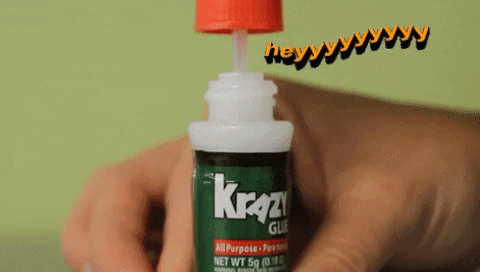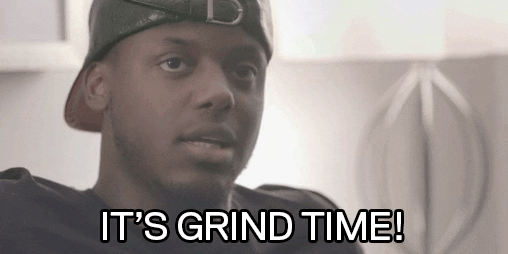Mistaken beliefs and super glue are like two peas in a pod: fast, versatile, strong, easy to use, and inexpensive. They also work pretty well until you get some stuck on your fingers and lose the ability to use your phalanges.
Take this mistaken belief: If I work hard, I will be successful.
This belief developed as a result of comparing myself to others. I frequently came up short because of doubts about my talent, the depth of my experience, and whether I knew the right people. So, to counter these uncomfortable thoughts, I chose to take one thing I do—work hard—and make that into a way of being and a belief.
This leads to another mistaken belief. If I’m successful, then I’m worthy of promotion, financial validation, and respect.
Which then leads to: If I’m worthy of promotion, financial validation, and respect then I am lovable.
Now I know the truth: everyone, including myself, is worthy of love without having to jump through hoops. However, belief frequently outweighs the truth.
What Is A Mistaken Belief?
A mistaken belief, according to Psychology Today, is “when someone has objective evidence that doesn't support their belief, but these beliefs still govern their lives and motivate their actions.”
It’s a concept that has been studied numerous times without clear results of why we believe what we believe – even when there is counterfactual evidence.
For those who are looking to move ahead in their career, a close examination of whether your beliefs are helpful, hurtful, or mistaken can help clear the path to achieving your goals.
The Purpose Of A Mistaken Belief
What I’ve come to realize is that the purpose of a mistaken belief is to be the super glue that holds our dreams and our actions together. If I dream X, then it will happen if I do Y. Let me give you a few examples to bring this alive.
Let’s go back to: If I work hard enough, I will be successful. One of my dreams was to work in prime-time drama development at a network. This dream evolved when I was working in prime-time current, which is the role at a network or studio that creatively supervises TV series that are currently on the air.
My challenge was that I was new to working in prime-time, having come out of children’s programming and animation for almost six years. I doubted my credibility, was concerned that I didn’t know who the players were, and didn’t know the “rules of engagement.” The underlying belief with these doubts is that “I need to know and not have a learning curve.”
So I chose to work harder to try to hide my shortcomings: I was the first to read scripts, the first to have my thoughts organized, the first in the office (and the last to leave), and said yes to meeting with any writer or director who was interested.
While there was evidence that people were getting promoted who didn’t do what I did, I refused to look at what made them successful. I was convinced I wasn’t as talented as them, so I needed to focus on what was within my grasp: working harder.
So, this dream of being successful (getting promoted) was glued to the mistaken belief that it would happen if I worked harder.
A few more mistaken beliefs related to being successful from my time clawing my way up the corporate ladder:
Morning people are successful: if I wake up early enough then I will be more prepared and energized, and yet there were dozens of executives higher up the ladder who didn’t get into the office until 10:00 am.
I need years of experience to be successful: if I can just stay in the “game” long enough, success will come my way, and yet there were a few executives who held more senior positions and were much younger.
Knowing the right people will help me be successful: if I can just network more and better, then I will have the necessary advocates (and maybe a mentor!) to be successful, and yet I had a good friend who didn’t come from an agency background and had no high-visibility friends and was still named head of a department at a major studio.
Mistaken Beliefs Have Consequences
Unfortunately, we can’t escape the downside of holding mistaken beliefs. Here’s the thing about them: mistaken beliefs like super glue rapidly bond to skin, can burn the eyes, repeated inhalation can cause dizziness, and when they set, they’re brittle. Let’s break the metaphor down:
Mistaken beliefs will stick to you like super glue. Once they touch the vulnerable parts of your heart or intellect, they will not let go, and they will feel like the truth, which makes them difficult to unstick.
Mistaken beliefs cloud your vision and stop you from seeing all the data. They burn the part of you that is the truth seeker and keep you small. Only the truth can move you forward.
Repeated use of mistaken beliefs will cause dizziness and drowsiness because they suck the oxygen out of your ability to thoroughly analyze a situation and choose the best option to move forward. So, you are not operating at full capacity.
Mistaken beliefs are brittle. They hold on and hold on until you have to break it off in order to be set free.
More Examples Of Mistaken Beliefs
It can be challenging to identify your mistaken beliefs because (as I said) they can feel like the truth.
One of the best ways to learn and see your mistaken beliefs is through hearing other people’s mistaken beliefs. Sometimes, we don’t even know that we have mistaken beliefs until we see how they operate in other people. I saw this phenomenon when leading a discussion about mistaken beliefs with a group of indie producers I led through my coaching practice.
Here’s a smattering of some of those beliefs (I have permission to share them publicly). You may recognize some or all!
Everyone has to be happy
I must be fast to go far
It’s a young person’s game
Other people’s opinions hold more value
Work has to come first
You have to be in LA to be successful
Have to choose a lane
The younger you are, the more opportunities
I don’t have the right face shape to be successful
I need to have all the skills
If I say no, I won’t be asked again
I have to put myself out there more
I got in too late
Money sources are only good for money and should be kept at a distance
You are retired when you have kids
Projects need to be packaged in order to sell
It’s important to time the marketplace
Need to have a big budget to have production value
Latino film has to have a certain look / feel / aesthetic
These beliefs hurt my heart — I can think of at least one instance in which each one of these statements is factually inaccurate. And yet, they are treated as universal truths and become the guardrails in which we conduct ourselves professionally.
Do you see how limiting these beliefs are? The consequences of living these beliefs include:
Not meeting one’s potential
Living other people’s values
Missing opportunities
Not meeting your definition of success
If you’re wondering why you are stuck, there’s a chance you are operating under mistaken beliefs.
Now What?
Identifying and unpacking mistaken beliefs requires great, great, great courage. It also involves self-compassion, empathy, and grace. It demands curiosity, patience and a microscope.
Course correcting from mistaken beliefs is not a light switch that you can easily switch on or off. The beliefs become ingrained in our thinking and way of being. Vigilance and tenacity are the handrails as you cross the bridge from mistaken belief to truth.
So, how to go about confronting mistaken beliefs, if you’re so inclined:
Examine your beliefs by writing them down. Consider the beliefs that were taught to you by your primary caregivers. Talk to a trusted friend about what they see. Work with a therapist or coach.
Look for the evidence, facts, and the truth to support your belief. If there is none, look for a value to honor instead of the mistaken belief. For example, when I have the compulsion to work harder to get ahead, I choose to value compassion. The compassion allows me to check in with myself about arbitrary deadlines I may have set in order to feel successful.
If there’s data to support your belief, then assess whether the belief you hold is helpful or hurtful. This is a tricky step because you may think a belief is helpful when the data shows you that it’s not. With the work harder belief, I had excellent results for years until I reached a point of diminishing returns. I was exhausted by developing multiple projects as a producer but not selling at the same rate as in previous years.
If you determine that a belief is hurtful, then choose a value to honor instead. With the realization that my sales quota had fallen, I course corrected to value curation over volume.
For many of my clients, their mistaken beliefs take a tremendous toll on their relationships, family, and overall well-being. I had one client whose belief that he needed to write every single day in order to launch his career in the entertainment industry caused him so much stress that he withdrew from his wife and kids. They were contemplating separation when we started to work together. After several sessions, we discovered that my client works best when writing in sprints. He thought he was doing writing wrong because he struggled with a daily writing schedule. When he learned that successful writers have a wide variety of processes, he recognized that he was holding a mistaken belief. My client was able to negotiate time to write in 2-3 day clusters, and it relieved his stress and addressed his family’s need for his presence.
Bottom Line
In the end, mistaken beliefs seem useful and reliable until you realize they don’t actually serve you. They might feel like the truth, but they cloud your vision, sap your energy, and hold you back. The key is recognizing them and gently peeling them away.
Examining our beliefs, especially the mistaken ones, takes courage and self-compassion. It’s about being curious and patient with ourselves. Write down your beliefs, discuss them with trusted friends or professionals, and look for evidence that supports or refutes them. Replace hurtful beliefs with values that truly serve you.
When we let go of mistaken beliefs, we create space for healthier, more empowering truths. This shift isn’t instantaneous—it’s a journey of continuous learning and self-awareness. But in doing so, we open ourselves to more authentic success and fulfillment, both personally and professionally. So, take a deep breath, grab your metaphorical acetone, and start ungluing those mistaken beliefs. Your future self will thank you.
Journal Prompts
Here are five journal prompts to help you explore and understand the themes of mistaken beliefs and their impact on your life:
What are some core beliefs you hold about success and your worthiness? Write down at least three beliefs you have about yourself in relation to work, relationships, and personal achievements. Reflect on where these beliefs originated and how they influence your actions.
Choose one of the beliefs you identified. What evidence supports this belief? Now, look for evidence that contradicts it. How does this new information make you feel about the belief?
Think of a time when a belief you held caused you stress, anxiety, or held you back. Describe the situation in detail. How did this belief affect your actions and emotions? What might have been different if you had not held this belief?
Consider a belief that you recognize as harmful or limiting. What value or principle could you adopt to replace this belief? For example, if you believe “I must work harder to be successful,” you might replace it with “I value balance and well-being in my pursuit of success.” How might this new value change your approach to your goals?
Imagine your future self free from a specific mistaken belief. How do you envision your life, relationships, and career without this belief holding you back? Write a letter to your present self from this future perspective, offering advice and encouragement on how to peel away this mistaken belief.
🙌🏾 Questions? Would you like additional support in accessing resilience? I offer private coaching sessions as well as in-person and virtual group work. Reach out directly here to set up a complimentary consultation.
If you’re resonating with what you’re reading, please consider subscribing. What’s that mean?
🙌🏾 You’ll receive regular emails (with lots of heart and a bit of humor) that share a tool or insight from my coaching practice.
🙌🏾 Typically the blog and blogcast will have a question at the end to provoke thought that supports you in your growth.
🙌🏾 Updates on offerings, free stuff, recommendations, referrals.
















Share this post